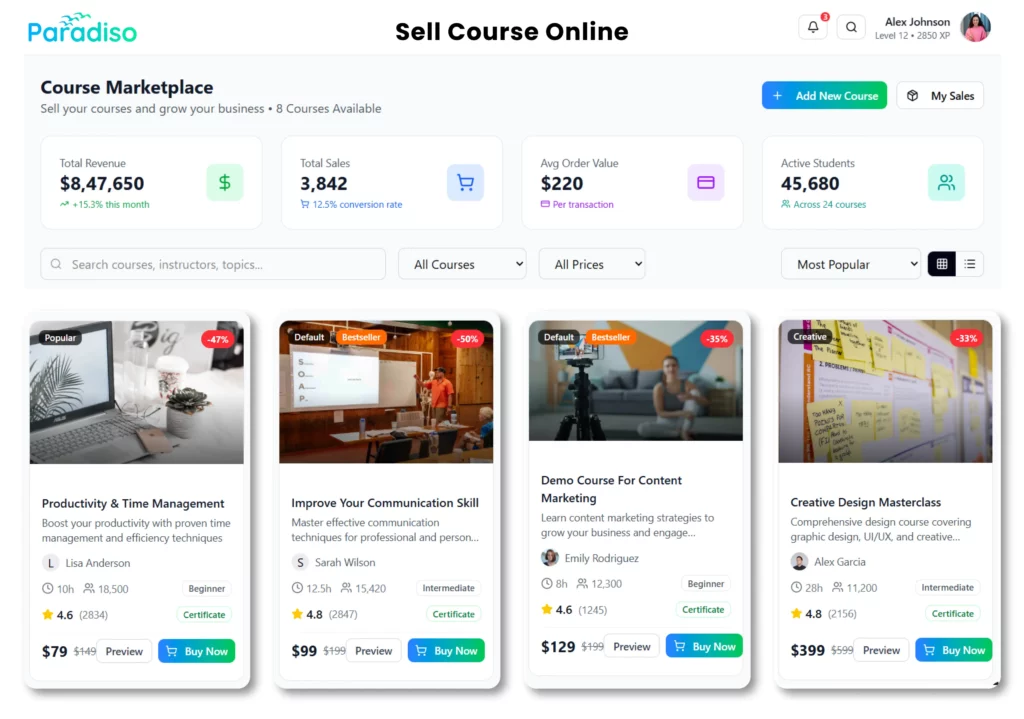In today’s fast-paced business environment, organizations constantly seek innovative ways to enhance employee performance and drive organizational success. One of the most transformative tools in this journey is Corporate LMS Software. Traditionally used for training and development, Learning Management Systems (LMS) are now evolving into robust Performance Management Systems. This shift reshapes how companies approach employee upskilling, reskilling, and performance tracking.
In this blog, we’ll explore how Corporate LMS Software is becoming a game-changer in performance management, why it’s essential for modern businesses, and how Paradiso LMS can help you unlock its full potential.
Why Performance Management Systems Matter in the Modern Workplace
Performance management is no longer just about annual reviews or setting KPIs. It’s about creating a continuous feedback loop that empowers employees to grow, adapt, and excel. According to a Gallup study, organizations with effective performance management systems experience 14% higher employee productivity and 18% higher revenue growth.
However, traditional performance management systems often fall short. They are time-consuming, lack real-time insights, and fail to align employee development with organizational goals. This is where Corporate LMS Software steps in, bridging the gap between learning and performance.
How Corporate LMS Software is Transforming Performance Management
1. Seamless Integration of Learning and Performance
Modern LMS platforms like Paradiso LMS are designed to seamlessly integrate learning and performance management. By offering personalized learning paths, real-time progress tracking, and skill gap analysis, these systems ensure employee development is directly tied to performance outcomes.
For example, the LMS can automatically recommend targeted training modules if an employee struggles with a specific skill. This proactive approach boosts performance and fosters a culture of continuous improvement.
2. Real-Time Feedback and Analytics
One of the biggest challenges with traditional performance management systems is the lack of real-time data. LMS for Performance Management solves this problem by providing actionable insights through advanced analytics.
Managers can track employee progress, identify skill gaps, and measure the impact of training programs in real-time. This data-driven approach enables organizations to make informed decisions and adjust strategies.
3. Employee Upskilling and Reskilling Made Easy
The rapid pace of technological change has made upskilling and reskilling a top priority for businesses. According to the World Economic Forum, 50% of all employees will need reskilling by 2025.
Corporate LMS Software is critical in this process by offering various courses, certifications, and microlearning modules. With Paradiso LMS, organizations can create customized learning paths that align with individual career goals and business objectives.
4. Enhanced Employee Engagement and Retention
Engaged employees are more likely to perform well and stay with the company. A well-implemented LMS can boost engagement by making learning interactive, accessible, and rewarding.
For instance, gamification features like badges, leaderboards, and rewards can motivate employees to complete training programs and apply their new skills in the workplace. This not only improves performance but also enhances job satisfaction and retention.
Real-Life Scenarios: LMS Software in Action
Scenario 1: A Tech Company’s Success Story
A leading tech company faced challenges keeping its workforce updated with the latest technologies. Implementing Paradiso LMS created a dynamic learning environment that included virtual labs, hands-on projects, and certifications. Within six months, employee performance improved by 25%, and the company saw a 15% increase in project delivery efficiency.
Scenario 2: Retail Industry Transformation
A retail chain struggling with high employee turnover used an LMS to deliver role-specific training and performance tracking. The result? A 30% reduction in turnover and a 20% increase in sales performance within a year.
Key Features to Look for in an LMS for Performance Management
When choosing an LMS Software for performance management, consider the following features:
- Skill Gap Analysis: Identify and address skill gaps effectively.
- Customizable Learning Paths: Tailor training programs to individual needs.
- Advanced Analytics: Gain insights into employee performance and training effectiveness.
- Mobile Accessibility: Enable learning on the go.
- Integration Capabilities: Seamlessly integrate with existing HR and performance management tools.
Paradiso LMS offers all these features, making it the ideal choice for organizations leveraging LMS for performance management.
The Future of Performance Management: A Holistic Approach
The future of performance management lies in a holistic approach that combines learning, development, and real-time feedback. Corporate LMS Software is at the forefront of this transformation, enabling organizations to create an agile, skilled, and future-ready workforce.
By investing in an LMS like Paradiso, businesses can improve performance and foster a culture of continuous learning and growth.
Conclusion
The role of Corporate LMS Software as a Performance Management System is no longer a trend—it’s a necessity. From real-time analytics to employee upskilling and reskilling, LMS platforms are redefining how organizations manage and enhance performance.
Ready to improve your performance management? Explore Paradiso LMS today and discover how it can transform your workforce into a high-performing, future-ready team.














